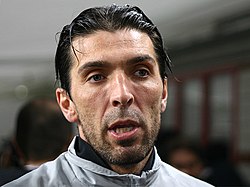History
The inaugural award, given at the "Oscar del Calcio AIC" ceremony, was presented after the conclusion of the 1996–97 Serie A season to forward Roberto Mancini of Sampdoria. [2] The following edition was won by Brazilian striker Ronaldo; during his first season with Inter Milan, he scored the second-most goals in Serie A, and the most in the UEFA Cup, which Inter won. [3] The next two recipients of the award were Lazio's Christian Vieri and Roma's Francesco Totti. [4] [5]
Zinedine Zidane won the award with Juventus in the 2000–01 season, becoming the first Frenchman to do so. [6] The following season, compatriot David Trezeguet won the award with the same club, the first time a player won the award while his team won the league in the same season. [7] [8] The seventh edition of the award, in the 2002–03 season, was the first and only time that two players won the award jointly: Czech Republic midfielder Pavel Nedvěd, who won the league with Juventus, [9] and Francesco Totti, who became the first player to win the award for a second time after scoring the most goals for his club that season. [10] Kaká won the award the following season, his debut season for AC Milan. [11] In the 2004–05 season, Alberto Gilardino won the award after scoring 24 goals, including the winning goal in a playoff that kept his club Parma from being relegated to Serie B. [12]
In the 2005–06 season, Fabio Cannavaro became the first defender to win the award. [13] He also won the FIFA World Player of the Year [14] and the Ballon d'Or [15] that season after he was signed by Real Madrid from Juventus midway through 2006 [16] in the wake of the Calciopoli scandal that saw the club stripped of their title and relegated to Serie B. [17] Kaká won the award the following season for the second time in three years after also winning the FIFA World Player of the Year. [18]
Zlatan Ibrahimović won the award for the next two seasons with Inter, as the club also won the league on each occasion. [19] [20] [21] [22] In 2008–09, the second season he won the award, he became the first player to win the award after winning the Capocannoniere award for the league's top scorer. [23] Before the 2009–10 season, Ibrahimović left Inter for Barcelona, replaced by Diego Milito who won the award that season, scoring the second-most goals as Inter won the league again. [24] [25] [26] Ibrahimović was loaned to Milan for the following season, where he won the award for a third time as Milan won the league. [27] [28]
Andrea Pirlo then equalled Ibrahimović's record of wins, winning the award for the next three seasons with Juventus, his first three seasons with the club after signing from Milan in the 2011–12 season, as the club also won the league on each occasion. [29] [30] [31] In his debut season, Pirlo created over 100 chances and completed 2643 passes that season, with an 87 per cent pass completion rate, completing 500 more passes than any other player in Serie A; the only player in the world to have completed more passes than him that season was Xavi. [32] [33] Teammate Carlos Tevez then won the award in the 2014–15 season, his last season with the club, and one where he was the club's top scorer with 20 goals. [34] [35] In the 2015–16 season, another Juventus player won the award, Leonardo Bonucci, becoming only the second defender to do so. [36] The following season, Juventus teammate Gianluigi Buffon became the first goalkeeper to win the award. As Juventus secured their sixth consecutive Serie A title, establishing an all-time record of successive triumphs in the competition, Buffon equalled Virginio Rosetta, Giovanni Ferrari, and Giuseppe Furino as the player with the most Italian league title victories (8). [38] [39] [40]
In the 2017–18 season, Inter player Mauro Icardi won the award, ending the six-year winning streak of Juventus players. [41] He was the joint top scorer in the league alongside Lazio's Ciro Immobile (29), [42] despite Juventus winning the league again. [43] Juventus player Cristiano Ronaldo would then win the award for the next two seasons. In the 2018–19 season, he became the highest ever transfer for an Italian club with his €100 million transfer from Real Madrid to Juventus. [44] In 2019–20, the second season he won the award, he scored the second-most goals in the league, while being the top scorer for his club once again (31). [47] In the 2020–21 season, Romelu Lukaku won the award after winning the Scudetto with Inter, ending a nine-year long streak by Juventus. [48] [49] In the 2021–22 season, Portuguese striker Rafael Leão won the award after contributing to AC Milan's first Italian Serie A title in 11 years. [50] [51] In the subsequent 2022–23 season, Nigerian striker Victor Osimhen claimed the award for his contributions to Napoli's first Italian Serie A title in 33 years, emerging also as the league's top scorer during the season. [52] [53] [54] In the 2023–24 season, Argentine striker Lautaro Martínez won the award after contributing to Inter's twentieth Italian Serie A title, emerging also as the league's top scorer during the season. [55] [56]
In the 2024–25 season, Scottish midfielder Scott McTominay won the award after playing a central role in Napoli's league title, [57] [58] becoming the first Scottish player to receive the honour.




